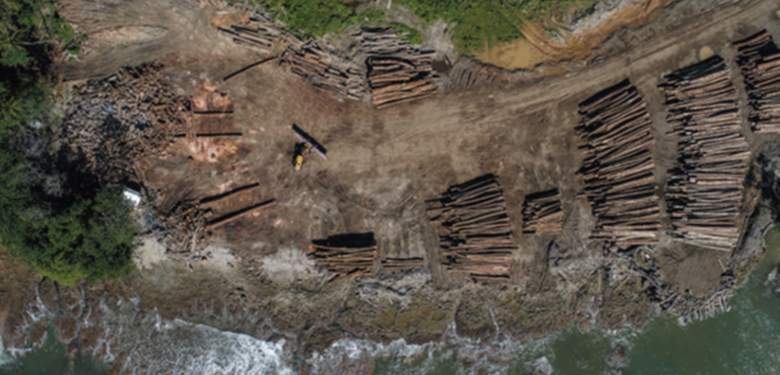
Forestry in the Solomon Islands: How overseas investment drives unsustainable development
To many people, the Solomon Islands appears like a tropical paradise with palm-fringed white sand beaches and pristine rainforests. It is often advertised as being untouched or unspoiled. But a new report from the NGO Global Witness has argued that logging in the Solomon Islands, a small country of 660,000 people in the South Pacific, is destroying natural forests there at 19 times the rate considered sustainable. The report says that if such logging continues at this rate, the natural forest will be exhausted by 2036. The investigation, using detailed research, satellite imagery, drone photography and trade data, shows that tropical timber across the Solomon Islands is being harvested on an unsustainable scale, and that much of the activity driving this environmental destruction is at high risk of being illegal.
Global Witness says that most of the exported wood goes to China for processing, but the ultimate consumer are buyers spread across the world. It argues that as other countries in Asia have tightened restrictions on timber through such measures as log export bans, China appears to have turned to other sources of timber such as the Solomon Islands. The Solomon Islands have struggled to protect their forests and the communities that rely on them.
Global Witness points out that there is no law in China banning this trade, meaning that all the imports are perfectly legal even though there’s a high risk of illegality at the point of harvest. But that potentially puts consumers of Chinese goods in places like the United States and Europe at risk of violating their own countries’ laws.
Most regulated markets, including the European Union and the U.S., have laws that require importers to verify that the products they are buying are sourced legally. But the Global Witness research has shown that the Solomon Islands has battled illegality and sustainability issues in the timber sector for decades. They cite previous research that suggests that bribes are a used by timber-harvesting companies; that landowners aren’t informed about logging and coerced into signing away the rights to log their land; and that conflicts over land are common.
Global Witness requested responses to their findings from companies in China and Malaysia, where many of the timber harvesters are based. No substantive replies were received.
Like so much unregulated overseas investment the consequences on the Solomon Islands and many other developing countries is far from sustainable. Environmental and social costs of investments that have disregard for sustainable development can be massive.
Global Witness argues that China has been right at the heart of the crisis and has called on the Solomon Islands to impose a moratorium on logging to allow an evaluation of existing logging efforts for sustainability and legality. The organization is also asking China to extend its commitments to addressing climate change and the illegal timber trade beyond its borders, both as a way to protect the forests of countries like the Solomon Islands and also the countries it does business with.
But in many cases China is simply processing wood into products it then sells on to international brands, retailers and distributers. Too many of them are turning a blind eye to what is happening deep down their supply chain in places like the Solomon Islands. Audits of Chinese factories will not uncover some of the unsustainable practices deeper down supply chains that damage the environment and disrupt people’s lives. And ultimately, it is individual consumers that are driving unsustainable forestry practices, if they do not demand information about where wood has been grown and harvested.
As Global Witness concludes, all of us need to be worried about consuming and being part of a force that destroys forests.